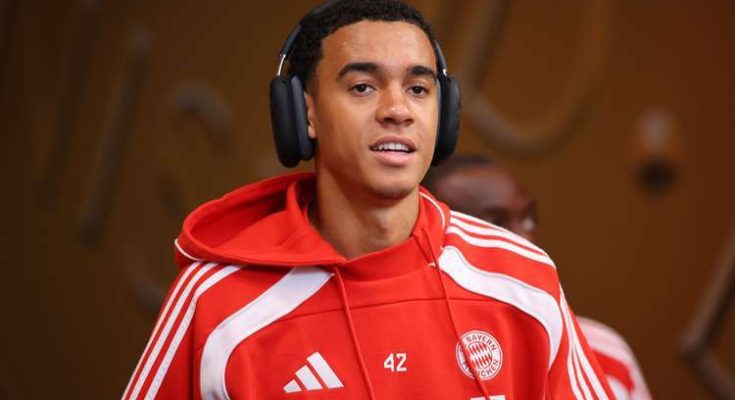The roar of the Allianz Arena is a symphony composed of 75,000 voices, a cacophony of hope, history, and relentless ambition. For weeks, however, a single, dissonant note has lingered in its grand chorus—the palpable absence of its youngest conductor, Jamal Musiala. The sight of the 20-year-old phenom crumpled on the turf against Darmstadt in early November sent a shiver through the very foundations of Bayern Munich. A torn hamstring, the brutal, unscripted halt to a player in the midst of crafting a masterpiece season, threatened to derail not just a career trajectory but an entire club’s aspirations. Yet, football, like any great drama, thrives on the narrative of return. And the return has begun. The recent images of Musiala back on the training ground, a ball once again a natural extension of his feet, have done more than just fill a column in a team news update; they have sparked a surge of hope, restored a critical dimension of firepower, and reignited the flickering title ambitions of a giant staring down a formidable challenge.
The void left by Musiala’s injury was not merely statistical, though the numbers themselves are staggering. At the time of his setback, he was arguably the most in-form player in the Bundesliga, a whirlwind of creativity, dribbling, and decisive contributions. His absence was felt in the very texture of Bayern’s play. The attacking third, once a canvas for his unpredictable genius, became more predictable, more calculable. Without his signature shimmies, his explosive bursts between the lines, and his almost telepathic link-up play, Bayern’s offense occasionally stuttered into a functional, rather than fearsome, unit. Harry Kane, the prolific centerpiece of the attack, suddenly found the pockets of space around him slightly tighter, the service into his lethal domain slightly less frequent. Musiala is the chaos agent in Thomas Tuchel’s structured system, the player who defies opposition tactical plans with a drop of a shoulder and a change of pace. His injury forced a recalibration, asking others to shoulder a creative burden for which there is no like-for-like replacement.
His comeback, therefore, is not just about adding a talented player back into the squad. It is about restoring an entire attacking philosophy. The sight of him in training, even in individual sessions progressing to integrated team drills, is a psychological shot in the arm for a squad engaged in a grueling, season-defining battle. For his teammates, it is the return of a brother-in-arms, a player whose joy on the pitch is infectious and whose quality elevates everyone around him. For the manager, Thomas Tuchel, it is the impending return of his most potent tactical wildcard, a player capable of unlocking the most stubborn low-block defenses—a challenge Bayern frequently faces in the Bundesliga. The hope he sparks is multifaceted: hope that his body will respond without setback, hope that he can quickly recapture his pre-injury rhythm, and hope that his unique brand of footballing magic can be the catalyst for a triumphant season finale.
This restoration of firepower is precisely what Bayern Munich requires as they navigate the treacherous final stretch of the season. The Bundesliga title race, for so long a foregone conclusion draped in Bavarian red, has been transformed into a gripping, nerve-shredding duel with an imperious Bayer Leverkusen under Xabi Alonso. The challenge is real, tangible, and historic. To overcome it, Bayern cannot simply be good; they must be transcendent. They need all their weapons firing in unison. The established brilliance of Kane, the relentless power of Leroy Sané, the guile of Thomas Müller, and the control of Joshua Kimmich form a formidable core. But Musiala is the X-factor. He is the element that can turn a tightly-contested, 70-minute stalemate into a victory with a moment of individual brilliance. His ability to carry the ball through congested midfield areas, committing defenders and creating disarray, is a skill set unmatched in the squad. His return doesn’t just add a goal threat or an assist; it adds unpredictability, a quality that is priceless in a title race where every point is precious and every goal monumental.
Furthermore, his comeback reignites the club’s title ambitions on a deeper, almost spiritual level. Bayern Munich’s identity is intrinsically linked with dominance, with a winning mentality that borders on the obsessive. The pressure of a potential first season without a Meisterschale in over a decade is a weight that hangs heavy. In such a context, the narrative of the returning hero is a powerful one. Musiala represents the future of the club—a homegrown talent who embodies the modern Bayern: globally sourced, locally honed, and world-class in execution. His fight to recover, his dedication in the gym and on the rehabilitation pitch, mirrors the fight the entire team must now show on the field. His journey back from adversity can serve as a metaphor for the team’s journey to reclaim their throne. It is a story of resilience, a testament to the club’s strength in depth and its unwavering belief in its own destiny.
The road ahead, of course, is paved with caution. The management of his reintegration will be delicate. The specter of re-injury, particularly with a muscular problem, looms large. Thomas Tuchel and the medical staff will be meticulously planning his minutes, likely introducing him from the bench initially, shielding him from the immediate furnace of a full 90-minute battle. The expectation will be immense, but it must be tempered with patience. The goal is not to have Musiala save the season in a single cameo, but to have him fully fit and firing for the crucial run-in, including the latter stages of the UEFA Champions League, where his talent is truly meant to shine.
As the Bundesliga enters its decisive phase, the return of Jamal Musiala feels like a plot twist of the most welcome kind. It is the cavalry arriving not over the hill, but from the treatment room. The symphony at the Allianz Arena has been missing its most dynamic soloist, its most joyful melody. His return to training is the first, tentative note of that melody returning. When he finally steps back onto the pitch, the roar that greets him will be one of pure, unadulterated belief. For in the feet of this young man lies not just breathtaking skill, but the renewed hope of a club, the restored firepower of an attack, and the reignited ambition to once again stand atop German football, proving that even the most brutal of setbacks cannot keep true talent down for long. The comeback is on, and for Bayern Munich, the title race just got a whole lot brighter.



